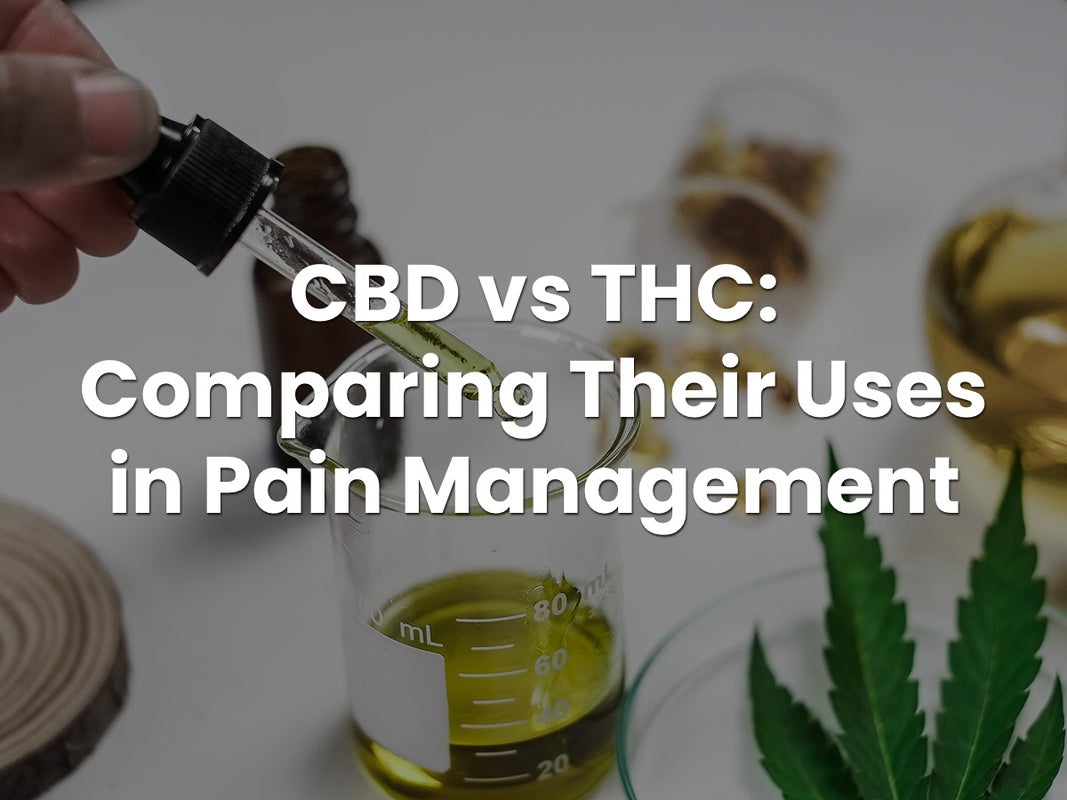Articles
CBD vs THC: Comparing Their Uses in Pain Management
In the evolving landscape of pain management, cannabinoids like CBD (cannabidiol) and THC (tetrahydrocannabinol) have garnered significant attention. As natural compounds found in the cannabis plant, both CBD and THC offer promising therapeutic benefits. However, they differ in their mechanisms and effects. This article delves into the distinctive roles of CBD and THC in pain management, comparing their uses, benefits, and potential side effects. Understanding these differences can help patients and healthcare providers make informed decisions about incorporating these cannabinoids into pain management strategies.
Comprehending CBD vs THC
What is CBD?
CBD, or cannabidiol, is a non-psychoactive compound found in cannabis. Unlike THC, CBD does not produce a “high,” making it a popular choice for those seeking therapeutic benefits without the mind-altering effects. CBD interacts with the body’s endocannabinoid system (ECS), crucial in regulating pain, mood, immune response, and other vital functions. By modulating ECS activity, CBD can help alleviate pain and inflammation.
What is THC?
THC, or tetrahydrocannabinol, is the psychoactive component of cannabis responsible for the “high” associated with marijuana use. THC binds directly to cannabinoid receptors in the brain, affecting perception, mood, and pain. Its psychoactive properties can benefit certain conditions but may not be suitable for everyone. THC also has significant pain-relieving properties despite these effects, making it a valuable component in some pain management treatments.
Mechanisms of Pain Relief
How CBD Alleviates Pain
CBD pain relief is primarily attributed to its interaction with the endocannabinoid system. By influencing ECS receptors, CBD helps reduce inflammation and modulate pain signals. Additionally, CBD enhances the levels of endocannabinoids in the body, further aiding in pain relief. Its anti-inflammatory properties are particularly beneficial for conditions like arthritis, where chronic inflammation contributes to pain.
How THC Alleviates Pain
THC pills for pain work through a different mechanism compared to CBD. THC binds directly to CB1 receptors in the brain and central nervous system, altering pain perception and providing significant analgesic effects. This direct interaction can be particularly effective for acute pain and conditions involving neuropathic pain, where traditional painkillers might be less effective.
Comparative Uses in Pain Management
Chronic Pain
Both CBD and THC are used to manage chronic pain, but their applications can differ based on the source of pain. CBD is often preferred for chronic inflammatory conditions such as arthritis, fibromyalgia, and multiple sclerosis due to its anti-inflammatory and non-psychoactive properties. On the other hand, THC might be more effective for conditions involving neuropathic pain or cancer-related pain, where its strong analgesic effects can provide relief that other medications cannot.
Acute Pain
In cases of acute pain, such as post-surgical pain or injury-related pain, THC pills for pain might offer more immediate relief due to their potent effects on pain perception. However, CBD can also be beneficial in these situations by reducing inflammation and promoting healing without the psychoactive effects of THC.
Combination Therapies
Some pain management strategies combine CBD and THC, leveraging the benefits of both cannabinoids. This approach can provide a balanced effect, where CBD’s anti-inflammatory and calming properties complement THC’s potent pain relief. Such combinations are often found in products designed for comprehensive pain management, offering a broader spectrum of relief.
Forms of Administration
CBD Pills
CBD pills are a popular method of administration for those seeking pain relief. These pills offer precise dosing and convenient consumption, making them ideal for daily use. The best CBD for joint pain relief is often found in pill form, as it allows for consistent delivery of the compound to manage chronic pain effectively.
THC Pills
Similarly, THC pills provide a controlled and convenient way to consume THC for pain relief. These pills can be beneficial for managing severe or chronic pain where potent analgesic effects are required. The controlled dosing also helps mitigate the potential psychoactive effects, allowing patients to manage their pain without experiencing excessive euphoria.
Other Forms
Both CBD and THC are available in various other forms, including oils, tinctures, edibles, and topicals. These different forms allow for flexibility in administration, catering to individual preferences and specific pain management needs. For example, CBD oils can be used sublingually for faster absorption, while topicals can be applied directly to painful areas for localized relief.
Research and Evidence
CBD Research
Recent studies have shown promising results for CBD in pain management. Research indicates that CBD can effectively reduce pain and inflammation in various conditions, including arthritis, multiple sclerosis, and chronic back pain. Clinical trials have also suggested that CBD can help improve the quality of life for patients suffering from chronic pain by reducing pain intensity and enhancing sleep quality.
THC Research
THC has pain-relieving properties, and Clinical evidence supports its efficacy in managing neuropathic pain, cancer-related pain, and spasticity associated with multiple sclerosis. THC’s ability to alter pain perception and provide immediate relief makes it a valuable option for patients with severe pain that is unresponsive to conventional treatments.
Combined CBD and THC Research
Research on combined CBD and THC therapies is ongoing, with many studies highlighting the synergistic effects of these cannabinoids. The “entourage effect” refers to the enhanced therapeutic benefits observed when CBD and THC are used together. This combination has shown promise in managing complex pain conditions, offering a broader range of relief compared to using either cannabinoid alone.
Practical Considerations
Determining the right dosage of CBD or THC for pain management can be challenging, as it varies based on individual needs, the type of pain, and the method of administration. It recommends starting with a low dose and gradually increasing until the desired pain relief is achieved. Consulting with a healthcare provider experienced in cannabinoid therapy can help tailor the dosage to individual requirements.
Conclusion
Understanding the differences between CBD and THC is crucial for effective pain management. While both cannabinoids offer significant pain-relieving benefits, their distinct properties make them suitable for different types of pain. CBD, with its anti-inflammatory and non-psychoactive effects, is ideal for chronic inflammatory conditions, whereas THC’s potent analgesic properties are beneficial for acute and neuropathic pain. By carefully considering the unique advantages of each, patients and healthcare providers can develop personalized pain management strategies that maximize relief and improve quality of life.
FAQs
What is the difference between CBD vs THC in pain management?
CBD is non-psychoactive and primarily used for its anti-inflammatory properties, making it suitable for chronic inflammatory conditions. THC, being psychoactive, is effective for neuropathic and acute pain due to its potent analgesic effects.
Can CBD and THC be used together for pain relief?
Yes, combining CBD and THC can provide a balanced approach to pain management, leveraging the benefits of both cannabinoids for comprehensive relief.
How do THC pills for pain differ from CBD pills?
THC pills provide potent pain relief by altering pain perception through direct interaction with CB1 receptors in the brain. In contrast, CBD pills primarily reduce inflammation and modulate pain signals without psychoactive effects.
What is the best CBD for joint pain relief?
The best CBD for joint pain relief often comes in pill form, providing consistent and precise dosing to manage chronic pain effectively.

